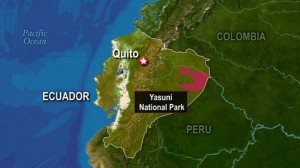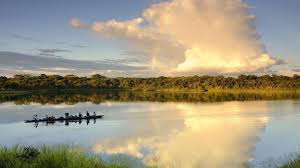Shooting Ourselves in the Foot? Oil Dependence vs. Nature
Aug 21st, 2013 | By admin | Category: Biodiversity/ConservationBy Suzanne York, www.howmany.org
Forget nature, as oil trumps conservation once again. Last week, Rafael Correa, Ecuador’s president, announced the end of an innovative plan to protect one of the most biodiverse places on the planet, opting instead to allow drilling for oil.
Known as the Yasuní-ITT Initiative, the plan called for permanently leaving more than 840 million barrels of oil in the ground in Yasuní National Park – and thus keeping more than 400 million tons of climate dioxide out of the atmosphere – in exchange for money from the international community to replace forgone revenue.And it was the lack of that money that Correa said doomed the initiative. In 2007, Ecuador proposed that if it received $3.6 billion dollars by 2023 it would not allow drilling in the park (This is roughly half of what Ecuador would have realized in revenues from exploiting the resource at 2007 prices). But last week the government said only $336 million had been pledged. The money raised would be used to finance alternative energy and community development projects.
The Yasuní-ITT Initiative has been hugely popular in Ecuador (the ITT refers to the three oil fields it already contains – Ishpingo, Tambococha, and Tiputini), with polls reflecting that close to 90 percent of Ecuadoreans oppose drilling in this region. Ecuador already has codified rights of nature in its constitution, recognizing the rights of ecosystems to exist and flourish.
Yasuní is home to two indigenous nations, the Kichwa and the Waorani, who will be greatly impacted by oil drilling. Scientists believe that one Yasuní hectare is home to a wider variety of trees, birds, reptiles and amphibians than in the US and Canada combined.
Guy Edwards, a Latin American analyst at Brown University, said, “Unquestionably, Ecuador’s Yasuní-ITT Initiative was a bold and ambitious attempt to avoid carbon emissions, protect biodiversity, uphold the rights of nature and indigenous peoples and encourage the transition to sustainable development.” However, he remarked on what is the glaring truth, that “However, the primacy of oil for Ecuador’s development reveals the fragility of such policies to economic necessity.”
National Geographic magazine ran an article earlier this year on Yasuní National Park and what is at stake, noting that “The park sits at the intersection of the Andes, the Equator, and the Amazon region, an ecological bull’s-eye where extremely rich communities of plants, amphibians, birds, and mammals in South America converge.”
This initiative could have been a game changer in the climate change debate. Imagine leaving so much carbon in the ground in a warming world, and the precedent that could set for other valuable ecosystems. Environmental and indigenous groups in Ecuador and around the world are calling for marches, protests and a possible referendum to stop the drilling.
The world is running out of beautiful, pristine places. We continue to pay a high price for our addiction to fossil fuels. Ecuador is a poor country in need of development, and it is not alone. We had – and still have – the chance to make the smart choice and leave the oil in the ground, in Ecuador and elsewhere. Otherwise we disrupt the web of life to our own peril. And in a world of 7 billion people with a projected population growth to hit 9.6 billion by 2050, we need to find ways to live more sustainably, and that means moving to clean energy and off nonrenewable fossil fuels.
Kelly Swing, founding director of the Tiputini Biodiversity Station on the outskirts of Yasuní National Park, knows all too well what is at stake. Talking with National Geographic, Swing wondered, “Should we use our capacity to tame nature and commandeer all the resources for ourselves and take it right up to the breaking point? Will we even know where that breaking point is?”
(And check out the January 2013 issue of National Geographic for some amazing pictures of what is at stake in Yasuní.)
Suzanne York is a senior writer with the Institute for Population Studies.



